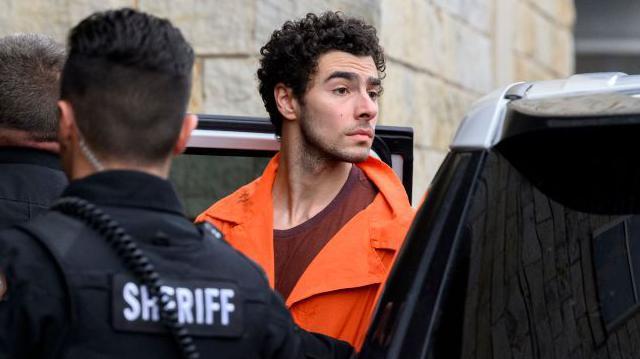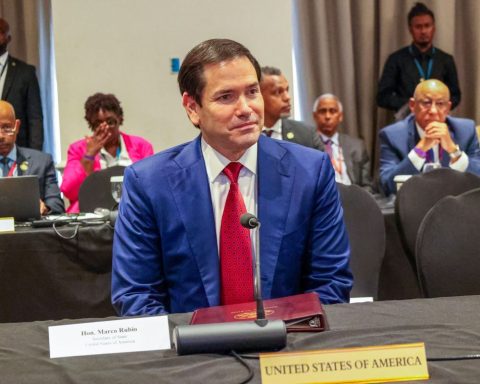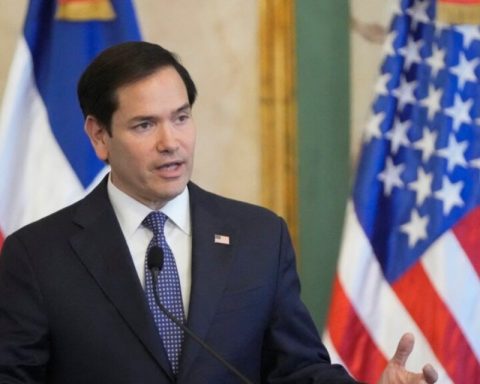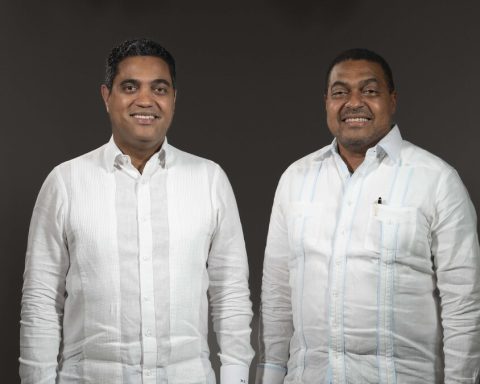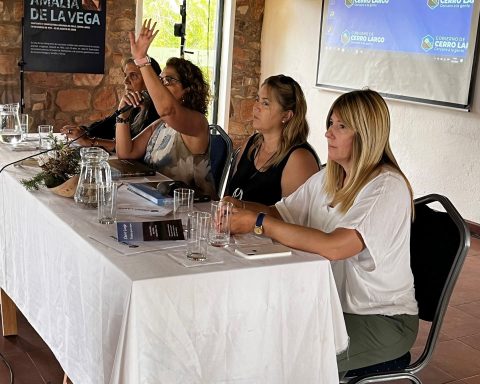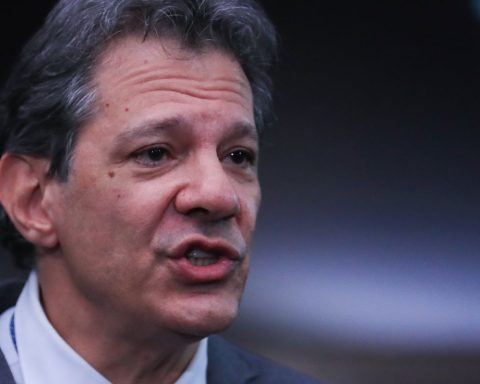They came wearing hoodies, masks and laughing nervously as they waited for the winner to be announced.
Just days after Brian Thompson, CEO of UnitedHealthcare, was murdered on a New York City sidewalk, these young people had gathered in Washington Square Park to compete in a contest of impersonators of the man wanted for the murder of the tall executive.
The event was sparsely attended and those who went saw it as a joke, said Talia Jane, a journalist who was there.
But this encounter underscored the obsession of some with the murder suspect, which has taken over social media since Dec. 4, in part because the simmering anger that exists in the US against private health insurers.
"There was already a lot of discontent, a lot of frustration, and (this) in a way fueled the fire"said Jane.
AND the obsession has only grown since the suspect was named as Luigi Mangione, a 26-year-old member of a prominent Baltimore family, educated at a prestigious university.
In TikTok videos, memes and group chats, the young man accused of shooting Thompson in the back has been fawned over and praised as a kind of folk hero.
This fetishization is not limited to the radical corners of the internet, which worries many analysts.
"We do not kill people in cold blood to resolve political differences or express a point of view"said Josh Shapiro, governor of Pennsylvania, the state where Mangione was arrested at a McDonald’s restaurant.
"In a civilized society, we are all less safe when ideologues take the law into their own hands"he assured.
The importance of your appearance
Almost immediately after Thompson was shot to death, some on the internet began praising his alleged killer.
On TikTok, people posted videos of the killer’s tour of New York, and playlists dedicated to the suspect began to appear on Spotify.
Once Mangione was arrested, these fans came to his defense.
The beginning of their legal battle led to anonymous donors to contribute thousands of dollars for his defense through various online fundraising activities.
The Etsy platform was flooded with clothing with messages in favor of Mangione, while Amazon removed similar products from its site.
The McDonald’s worker who allegedly recognized him and called the police has become the target of online hate, while the fast food franchise itself has received bad reviews online.
The Altoona, Pennsylvania police department, responsible for the suspect’s arrest, even received death threats.
Much of this online backlash has focused on her appearance. On the internet they nicknamed him "sexy assassin".
In fact, the appearance of Mangione, who before being arrested had shared shirtless images on his social media, is now clearly part of his appeal, said cultural critic Blakely Thornton.
The Americans are indeed "scheduled" to trust and empathize with men who look like Mangione, Thornton said.
"That’s why they are the protagonists of our movies, books and stories.".
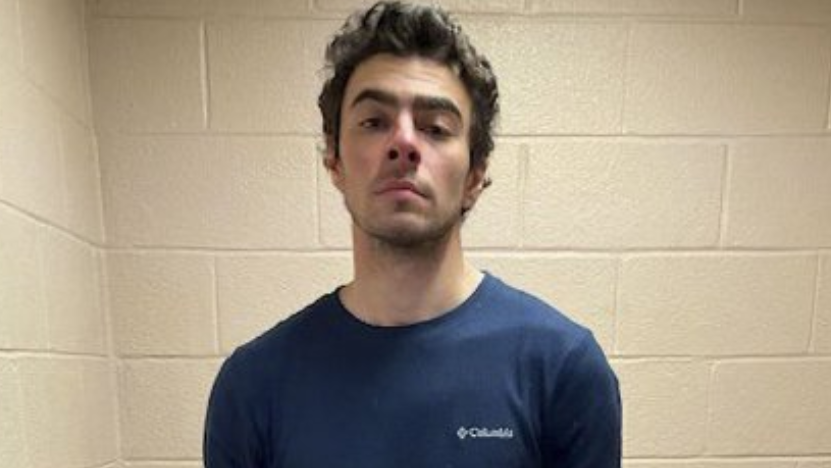
Public adoration of handsome men accused of crimes is not new: from Ted Bundy to Jeremy Meeks, many violent men considered attractive have gained followers.
But Professor Tanya Horeck, an expert on digital culture and real murders at Anglia Ruskin University, says social media have given those feelings massive visibility and have helped spread them.
Internet has caused "a confusion on the line between celebrity and criminality"Horeck told the BBC, adding that when people see a beautiful person appear on their networks, their first thought is lust, not moral criticism.
"The atmosphere around Luigi Mangione is ‘thirsty’"he stated.
Beyond his looks, a big part of Mangione’s online appeal is clearly his apparent anger against the private healthcare industry and corporate elites in general. American media reported that Mangione was arrested carrying a handwritten document that read: "These parasites deserved it".
The Network Contagion Research Institute (NCRI), a New Jersey-based extremism research group, said that after Thompson’s murder the hashtag #EatTheRich went viral.
Since Mangione’s arrest, variations of #FreeLuigi have been posted on the X network more than 50,000 times, likely garnering tens of millions of impressions.
And by some measures, engagements with posts about Thompson’s assassination on platforms like X, Reddit and others surpassed those of the assassination attempt on Donald Trump in July.
Normalization of violence
An analysis of a sample of comments by market research firm OneCliq found that the vast majority (four in five) contained criticism of the healthcare system.
Mangione’s X account has gained more than 400,000 followers since he was arrested.
The murder also seemed to inspire others to take action against health care insurers: posters appeared "wanted" with the names of other CEOs in New York City, and a woman in Florida was arrested after telling an insurance agent over the phone "Delay, deny, depose. You are next"alluding to the words inscribed on bullet casings found at the scene of Thompson’s murder.
Alex Goldenberg, senior advisor at NCRI, called the online reaction a "turning point" and "a catalyst for the normalization of political violence that was once confined to fringe extremists".
"The dynamics we’re seeing are eerily similar to activity on platforms like 4chan, 8chan, Discord, and other dark corners of the internet, where mass shootings are often greeted with glee."said.
Tim Weninger, a computer science professor at the University of Notre Dame and an expert in social media and artificial intelligence, said the evidence suggests the outpouring of solidarity with the alleged killer was genuine.
"People are angry at the healthcare industry and is using social media to express his frustrations"said. "They are expressing those frustrations by supporting this suspect".
Recent research by the Commonwealth Fund, a health policy institute, found that 45% of insured working-age adults in the US were charged for something they thought should have been free or covered by insurance, and 17% of respondents said their insurer denied them coverage for care recommended by their doctor.
There are signs that the shooting has prompted some introspection on the part of healthcare companies.
"I think we’re all taking a step back and trying to understand what’s going on with patients and their experiences."said the sustainability director of the Pfizer laboratory, Caroline Roan, at a conference in New York on Wednesday, as reported by the Reuters agency.
Some of the people who have been protesting health insurance companies for years understand some of the darker feelings Thompson’s case stirs up, even if they don’t support them.
"It is a horrible act of violence and I absolutely condemn it regardless of the reason."said Jenn Coffey, who has been fighting to have UHC cover her medical bills. "But I’m not surprised by the reaction.".
Coffey, 53, of New Hampshire, was diagnosed with breast cancer in 2013 and later became ill with complex regional pain syndrome, a potentially debilitating neurological condition. When a doctor suggested he try ketamine therapy, his UHC insurance did not cover the procedure, he said. He has since become involved in a protest campaign organized by the activist group People’s Action.
Coffey’s illness forced her to stop working. She said she started a fundraising campaign and had to sell most of her belongings to be able to pay for the treatment herself.
"I can have some normality. I can sit and paint, or I can enjoy a meal with my family" thanks to the treatment, he said. "I can have a life worth living".
UnitedHealth Group told the BBC they could not comment on individual cases for privacy reasons.
The forgetfulness of the victim
At the same time, much of the online discussion has effectively ignored the victim, Brian Thompson, who was 50 years old.
"It’s incredibly bleak that Thompson’s death hasn’t been reported as much because ultimately one person died, one person was murdered"said Blakely Thornton.
"The collective anger at (the healthcare industry) truly surpasses what remains a tragedy".
In his latest LinkedIn post, Thompson talked about efforts to make healthcare more affordable and was criticized in the comments.
CBS News, the BBC’s US partner, obtained a message that UnitedHealth CEO Andrew Witty sent to staff this week, remembering Thompson and saying his slain colleague was "one of the good ones".
"He was certainly one of the smartest guys. I think that was one of the best. I’m going to miss him. And I’m incredibly proud to call him my friend."wrote.
In the email, the company shared messages from customers, including one who wrote about his recovery from cancer, saying his treatment was paid for by insurance company benefits.
"I am grateful to UHC and everyone who works within a broken system for helping as many people as they can"he wrote, according to the company.
Another message said: "It is very sad that this world is so hateful. I have always had great experiences with UHC".
"My heart goes out to the family and I can’t imagine what they are having to deal with with that [asesinato]. It’s terrible to me that this is the catalyst for this debate"says Jenn Coffey, who is a UHC policyholder.
"I would have preferred to sit down and talk to him.".
With additional reporting by Grace Dean
click here to read more stories from BBC News Mundo.
Subscribe here to our new newsletter to receive a selection of our best content of the week every Friday.
You can also follow us on YouTube, instagram, TikTok, x, Facebook and on our channel WhatsApp.
And remember that you can receive notifications in our app. Download the latest version and activate them.
- How the murder in New York of Brian Thompson, director of the largest US insurer, reveals anger against the private health system
- New York suffers an unusual 4.8 earthquake, the worst in 40 years
- A suspect is arrested in connection with the murder in New York of Brian Thompson, the director of the largest insurer in the US.
